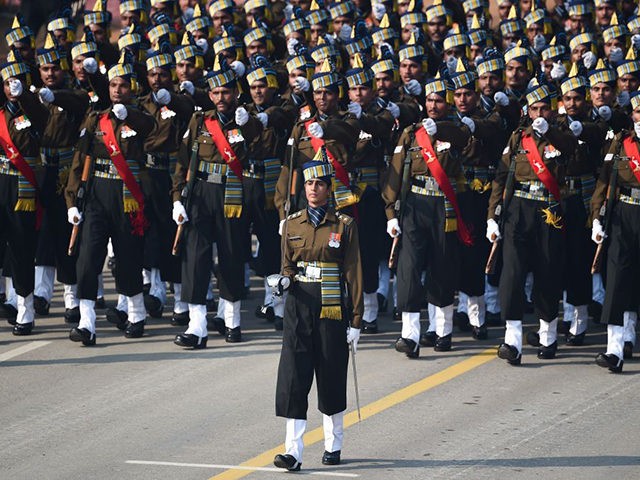Indian Defense Minister Rajnath Singh visited his country’s border with China on Friday, inspecting the Ladakh region where communist People’s Liberation Army (PLA) soldiers attacked their Indian counterparts with sticks and rocks last month.
Singh applauded the courage of Indian soldiers in defending their land and, while affirming that Beijing and New Delhi are engaged in ongoing diplomatic talks, vowed to the Indian people that the administration of Prime Minister Narendra Modi would not allow the Communist Party to seize Indian territory.
“Talks are underway to resolve the border dispute but, to what extent it can be resolved, I cannot guarantee. I can assure you, not one inch of our land can be taken by any power in the world. If a solution can be found by talks, there is nothing better,” Singh said in Ladakh.
Singh addressed the Indian border soldiers directly, saying the nation was “proud” of them and would not let down those killed in the assault by China.
“India is proud of its brave soldiers. Not only did you protect the border, but you have also protected 130 crore [1.3 billion] Indians. Greatest self-respect is national self-respect,” Singh said, according to India’s Zee News. “We will not allow the sacrifice of soldiers to go in vain. Prime Minister Narendra Modi has also said that their sacrifice will not go in vain.”
“We do not want unrest, we want peace. We have not hurt the self-respect of any country of the world but if anyone hurts our self-respect we will not tolerate it,” Singh reportedly continued. “The martyrdom that our soldiers is a matter of sorrow for entire India. Don’t consider yourself weak, we have got the strong leadership of Narendra Modi.”
The Indian government revealed that over 20 soldiers died in a brawl with Chinese PLA troops on June 15. The fight reportedly began when Indian border soldiers found PLA troops in the Galwan Valley, Indian Himalayan territory, and confronted them about why they had set up tents in India. Indian media reports citing government officials said the PLA soldiers responded to the confrontation by attacking the Indian soldiers with rocks and sticks wrapped in barbed wire. Some of those killed died of hypothermia while others were beaten off of steep cliffs, falling to their deaths.
The Indian government claimed that twice the number of Chinese troops died as Indian soldiers. The Chinese Communist Party has denied this claim but refuses to offer any information on its number of casualties while admitting the number is greater than zero. Multiple reports indicate that China has censored social media posts inquiring about the wellbeing of PLA border troops and the Communist Party may be pressuring the relatives of those killed not to hold funerals or bury their dead.
Singh’s visit to Ladakh follows one by Modi himself in early July, in which he praised India’s military as the best in the world and warned China, “the era of expansionism is over.”
“Today the head of every citizen of the country bows to you in respect. From Leh to Ladakh and from Kargil to Siachen, all regions have witnessed the bravery of our soldiers,” Modi said in remarks before meeting with those injured in the Galwan Valley battle. “Your will power is as strong and firm as the Himalayas … Your courage is higher than the heights where you are serving today. When the safety of the country is in your hands, then there is a belief. Not only me, but the entire nation believes in you.”
Chinese dictator Xi Jinping has yet to visit the border or send any high-ranking officials there. Xi has largely refused to comment or involve himself in the dispute with India. Instead, Xi appears to be attempting to shore up support from multinational corporations as calls to boycott Chinese businesses in the aftermath of the Galwan Valley battle strengthen Modi’s “make in India” initiative to attract more foreign business.
In a letter to dozens of CEOs of major global corporations revealed by Chinese state media on Thursday, Xi reportedly insisted China “will be unswervingly committed to pursuing the path of peaceful development, making economic globalization more open, inclusive, balanced and beneficial to all, and promoting the building of an open world economy.” The letter appeared to address concerns that, under Xi, China had become less business-friendly, particularly in light of Xi’s decision to illegally impose strict speech restrictions onto nominally autonomous Hong Kong. As a capitalist center, Hong Kong has been the driving economic force of the Chinese state since its takeover by Beijing in 1997. The “national security” law passed under Xi has triggered waves of corporate exits from the city by companies fearing its employees could see a minimum of ten years in prison at any time for “crimes” like supporting the wrong sports team.
While companies begin exiting China, India has seen increased interest and investment from companies like Google and Walmart. These companies also appear to be abiding by policies such as mandatory labels that tell consumers where a product sold was manufactured, allowing them to more easily boycott Chinese products. Amazon India this week alerted all sellers that they must reveal the origins of all their products.
After initial concerns that India’s economy was too weak to sustain a true “boycott China” movement, reports began to indicate that Modi’s moves to distance his country from Chinese companies was having significant effects. The most dramatic of these moves, taken in late June after the Galwan Valley battle, was to ban 59 Chinese-made mobile phone applications, including popular social media applications like Tiktok, Weibo, and WeChat. Indian officials contend that, as these companies must by law cooperate with the PLA, they present a national security threat.

COMMENTS
Please let us know if you're having issues with commenting.